

All mythologies. Flickr – Compartilhamento de fotos! Mythical Creatures List, Mythical Creatures A-Z. Family tree of the Greek gods. Key: The essential Olympians' names are given in bold font.
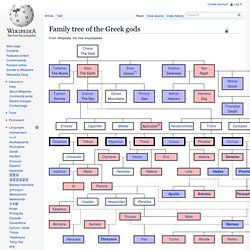
See also List of Greek mythological figures Notes External links Media related to Family trees of Greek mythology at Wikimedia Commons. We Are Atheism. The God Who Wasn’t There Documentary filmmaker Brian Flemming examines the Bible and discusses the history of early Christianity, raising doubts as to whether the New Testament personage Jesus ever really existed.

Flemming examines the similarity of the Jesus story to other savior myths of the time and points to inexplicable gaps in early Christian history that combine to shed doubt on the Bible’s Jesus story. The Invention of Lying It’s a world where everyone tells the truth – and just about anything they’re thinking. Mark Bellison is a screenwriter, about to be fired. Francis Chan - Jesus More Than a Savior. George Carlin - Religion is bullshit. Dunning–Kruger effect. Cognitive bias about one's own skill The Dunning–Kruger effect is a hypothetical cognitive bias stating that people with low ability at a task overestimate their own ability, and that people with high ability at a task underestimate their own ability.
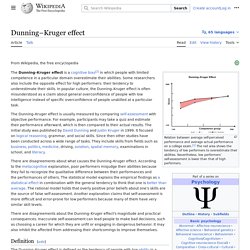
As described by social psychologists David Dunning and Justin Kruger, the bias results from an internal illusion in people of low ability and from an external misperception in people of high ability; that is, "the miscalibration of the incompetent stems from an error about the self, whereas the miscalibration of the highly competent stems from an error about others".[1] It is related to the cognitive bias of illusory superiority and comes from people's inability to recognize their lack of ability.
Without the self-awareness of metacognition, people cannot objectively evaluate their level of competence. Original study[edit] Later studies[edit] Mathematical critique[edit] Paired measures[edit] Wallpaper-31925.jpg (Imagem JPEG, 1900x1200 pixéis) - Dimensão/Escala (50%) Abacaxigod.jpg (Imagem JPEG, 1024x683 pixéis) Isf4uZkqRyjpV.jpg (JPEG Image, 659x29999 pixels) - Scaled (2. Crucifixes, Vampires & Religion. Religion is like a penis. BibleContradictions-ReasonProject.png (Imagem PNG, 3327x4418 pixéis)
Russell's teapot. An Atheist Manifesto. Update: (2/08/2006 1:35 p.m.
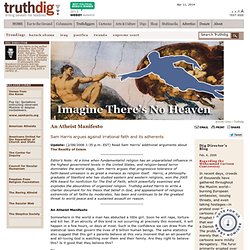
EST) Read Sam Harris’ additional arguments about The Reality of Islam Editor’s Note: At a time when fundamentalist religion has an unparalleled influence in the highest government levels in the United States, and religion-based terror dominates the world stage, Sam Harris argues that progressive tolerance of faith-based unreason is as great a menace as religion itself. Harris, a philosophy graduate of Stanford who has studied eastern and western religions, won the 2005 PEN Award for nonfiction for The End of Faith, which powerfully examines and explodes the absurdities of organized religion.
Truthdig asked Harris to write a charter document for his thesis that belief in God, and appeasement of religious extremists of all faiths by moderates, has been and continues to be the greatest threat to world peace and a sustained assault on reason. An Atheist Manifesto Somewhere in the world a man has abducted a little girl. The Improbability of God. The Improbability of God by Richard Dawkins from Free Inquiry, Volume 18, Number 3.
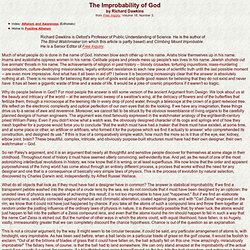
Much of what people do is done in the name of God. Irishmen blow each other up in his name. Arabs blow themselves up in his name. Imams and ayatollahs oppress women in his name. Celibate popes and priests mess up people's sex lives in his name. Why do people believe in God? So ran Paley's argument, and it is an argument that nearly all thoughtful and sensitive people discover for themselves at some stage in their childhood. What do all objects that look as if they must have had a designer have in common? This is not a circular argument, by the way.
Is it necessary to take the word of others about answers to the most important of questions? The author contends no. Ignosticism. Ignosticism or igtheism is the idea that every theological position assumes too much about the concept of God and other theological concepts; including (but not limited to) concepts of faith, spirituality, heaven, hell, afterlife, damnation, salvation, sin and the soul.
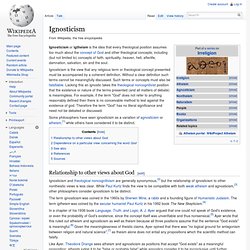
Ignosticism is the view that any religious term or theological concept presented must be accompanied by a coherent definition. Without a clear definition such terms cannot be meaningfully discussed. Such terms or concepts must also be falsifiable. Portal:Evolutionary biology. Abiogenesis. Scientific hypotheses about the origins of life can be divided into a number of categories.

Many approaches investigate how self-replicating molecules or their components came into existence. On the assumption that life originated spontaneously on Earth, the Miller–Urey experiment and similar experiments demonstrated that most amino acids, often called "the building blocks of life", can be racemically synthesized in conditions which were intended to be similar to those of the early Earth.
Several mechanisms have been investigated, including lightning and radiation. Other approaches ("metabolism first" hypotheses) focus on understanding how catalysis in chemical systems in the early Earth might have provided the precursor molecules necessary for self-replication. Early conditions[edit] History of Religion. Religion and Sexual Ethics.